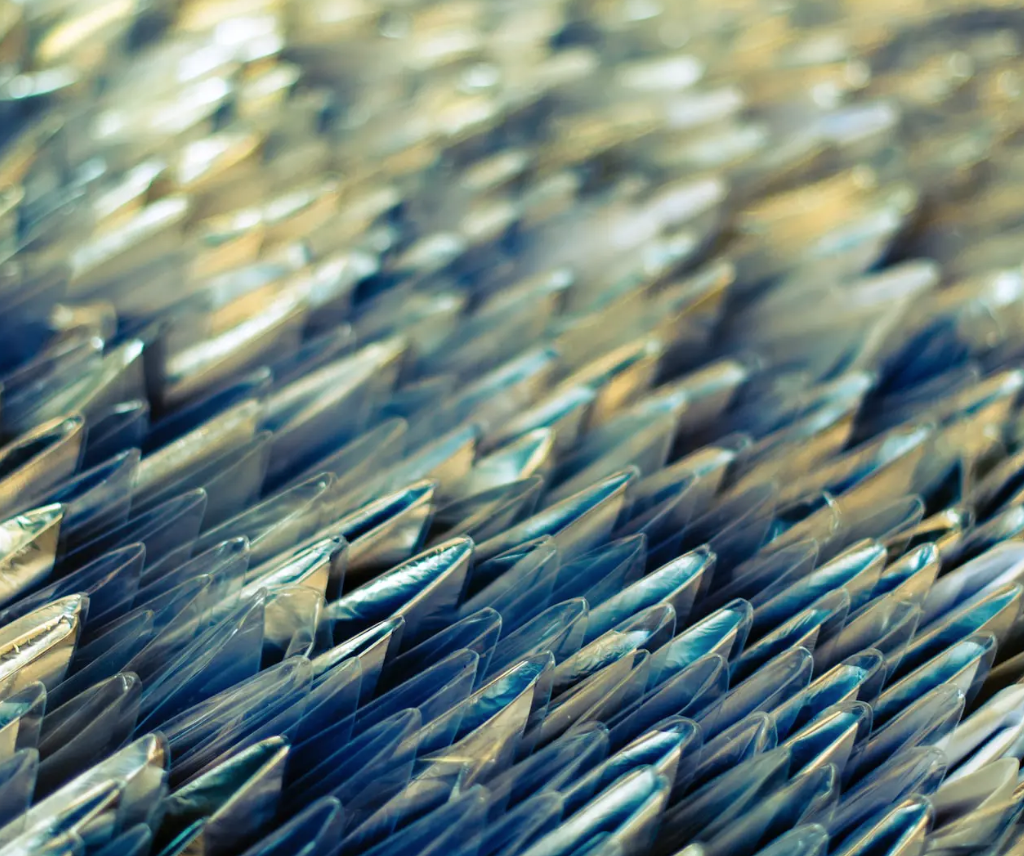The bio-titles are 100% natural, do not require the use of resins, plastics or glues
(sustainabilityenvironment.com) – Building waste is one of the most complexes to manage because of the composition of the materials that generate it: this is one of the prerequisites that led Erik de Laurens to create his bio-tiles, composed of a material formed by fish scales: the SCALITE.
While attending a master’s degree in product design at the Royal College of Art in London, the founder of the company SCALE looked with concern at social phenomena that changed the face of his city.
The factories continued to close, with the serious risk of the dispersion of a wealth of industrial know-how difficult to rebuild; at the same time, however, the problems of pollution became increasingly evident, and de Laurens felt the need to invent something that would intervene on both aspects: breaking into the world of materials engineering by bringing a new paradigm, in which they could be produced in a local and sustainable way.
From this aspiration was born the SCALITE, a material composed of fish scales, from which it is possible to compose bio-tiles
The importance of bio-tiles for the flow of building waste
De Laurens’ invention addresses a number of issues that can no longer be put off. As the Planet continues its race towards ecological transition and the governments of the richest countries try to introduce measures and policies that accelerate the process, there are a number of more critical areas on which to intervene. The construction sector is one of the main, ones because it produces an important amount of waste that is difficult and expensive to recycle, and that requires the identification of new materials, more compatible with the needs of the planet.
To understand the extent of the problem, just think that, in a year in which our country has shone for the recycling chain, one of the painful notes of our performance was precisely the management of inert waste: although our numbers keep us in line with the European targets (we have started to recycle 77.9% of the waste produced against an EU target of 70%), we are facing a potential crisis in the sector due to the entry into force of the DM on the End of Waste, which should regulate the recycling of aggregates but which has repeatedly been criticized for the extreme rigidity in the assessments of the reusability of materials. Both the announcement of the guidelines and the issuance of the decree have aroused the concerns of professionals, who have denounced the danger of a real crisis in the sector.
Identifying new ways of managing flows is therefore a priority, while the research world is focused on the problem upstream: finding materials that can be more easily disposed of, making waste from construction and construction in line with the needs of the circular economy.
The SCALE bio-tiles produced by SCALE go in this direction.
The research that led to the first bio-tiles produced by fish scales
The idea of producing a material with fish scales is based on the fact that fish scales are a mineral that is wasted by the fishing industry: a raw material, available in high quantities and at low prices, According to Erik, the potential was not recognized.
For this reason he decided to dedicate his research to it, following which he invented a new stone-like material, composed entirely of fish scales. He called it SCALITE, to refer to the name of plastics such as bakelite, ebonite or galatite.
Before moving on to the production of scale bio-titles, the material has been tested for different uses: glasses, beakers, and a table.
100% natural fish scale bio-tiles
The scales of all fish species are composed of a mineral part, hydroxyapatite, and an organic part, collagen. Depending on the species, however, the proportion of the components varies.
SCALITE is produced using a biopolymer that is extracted from the scales and mixed with hydroxyapatite. The result of the process is a powder, which can be compressed and used to build the sheets that will make the bio-tiles.
The material is therefore 100% natural, does not require the use of resins, plastics or glues, does not contain any toxic agent and this, linked to its resistance, makes it suitable for the production of bio-tiles SCALE, a wide range of products suitable for interior furnishings.
